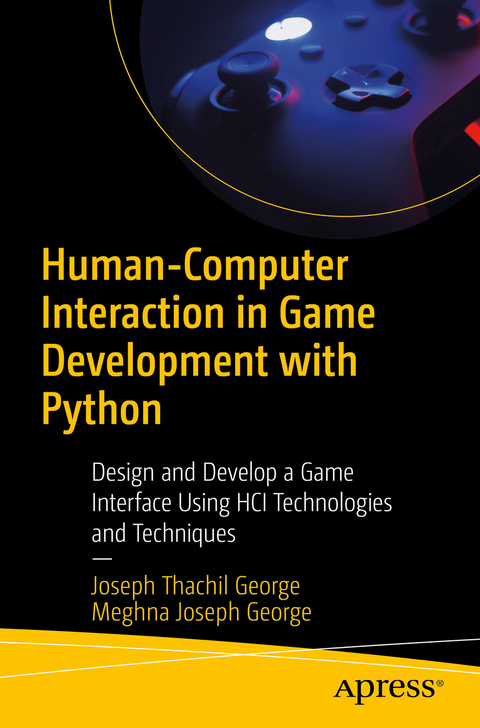
Human-Computer Interaction in Game Development with Python
Apress (Verlag)
978-1-4842-8181-9 (ISBN)
You'll first gain a basic introduction to fundamental concepts and practices of HCI before diving into the fundamental concepts of game interface design and technology. You'll learn how to design a gaming interface through practical examples using Python. This is followed by a brief look at how HCI can offer immersive gaming experiences for players and a review of key elements such as interface, usability, user-centered design, and user interface in terms of efficacy. You will also learn how to implement usability aspects in gaming interfaces with examples using Python.
Additionally, the book discusses major challenges that game publishers and developers face, and how they can be resolved using HCI techniques. The question of playability is reviewed throughout the game production process. After working through this book's practical examples, you'll have the knowledge required to begin developing compelling, can't-put-the-controller down games of your own.
What You'll Learn
Master HCI tools and methodologies
Understand the concept of HCI strategies in the game development cycle
Develop a game in Python using the HCI approach
Utilize gamification techniques in Human-Computer Interaction
Grasp concepts of usability, user experience and user-centered design processes and their application
Who This Book Is For
Programmers, engineers, and students interested in creating and implementing computer games using HCI technologies. Prior experience with game development is recommended.
Joseph Thachil George is an IT Security Engineer based in Germany. He also worked as a technical consultant for International Game Technology (IGT) in Italy. Joseph is currently pursuing his doctorate (PhD) in computer science and engineering at the University of Lisbon, Portugal. He has an M.S. in cybersecurity from the Università degli Studi di Firenze, Italy. He is also part of the DISIA research group at the University of Florence, Italy, and the research group (INESC-ID Lisbon) at the University of Lisbon, Portugal. His research interests cover automatic exploit generation; exploitation of vulnerabilities; chaining of vulnerabilities; security of web applications; and JavaScript code exploits. At IGT, he has been a part of various projects related to game configuration and integration in various platforms, specializing in Java and Spring Boot-based projects. He has also worked for various companies in India, Angola, Portugal, and UK and has seven years of experience with various IT companies. Meghna Joseph George is a Cloud Engineer based in Germany. She is an AWS-certified solutions architect. She received a B.S. in System Management and M.S. in economics.
Chapter 1: Human-Computer Interaction Tools and Methodologies.- Chapter 2: Human-Computer Interaction and Game Design and Development.- Chapter 3: Developing a Video Game.- Chapter 4: Turning Points in Game Development.- Chapter 5: Developing a Game in Python.- Chapter 6: Game Development: Industry Standards.- Chapter 7: Gamification in Human-Computer Interaction.- Chapter 8: Human-Computer Interaction Research and Development.- 9: Recommendations and Concluding Comments.
| Erscheinungsdatum | 23.05.2022 |
|---|---|
| Zusatzinfo | 61 Illustrations, color; 30 Illustrations, black and white; XVI, 323 p. 91 illus., 61 illus. in color. |
| Verlagsort | Berkley |
| Sprache | englisch |
| Maße | 155 x 235 mm |
| Themenwelt | Mathematik / Informatik ► Informatik ► Programmiersprachen / -werkzeuge |
| Informatik ► Software Entwicklung ► Spieleprogrammierung | |
| Informatik ► Software Entwicklung ► User Interfaces (HCI) | |
| Schlagworte | Communication • Game Design • Game interface • Game Programming • Gamification • HCI • Human-Computer interaction • Interactive design • Interface Design • Python • Usability |
| ISBN-10 | 1-4842-8181-0 / 1484281810 |
| ISBN-13 | 978-1-4842-8181-9 / 9781484281819 |
| Zustand | Neuware |
| Informationen gemäß Produktsicherheitsverordnung (GPSR) | |
| Haben Sie eine Frage zum Produkt? |
aus dem Bereich



